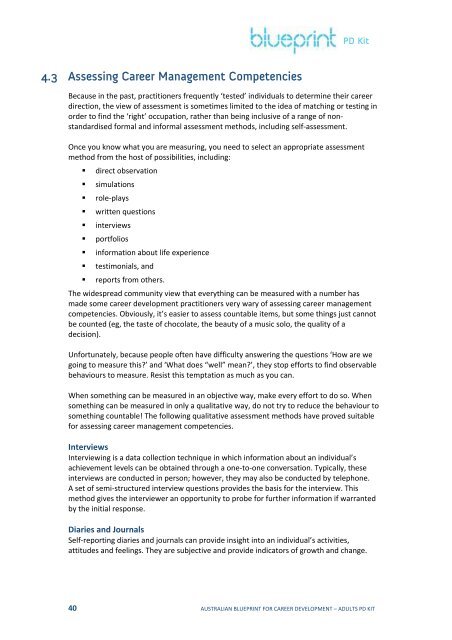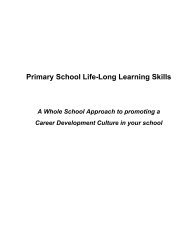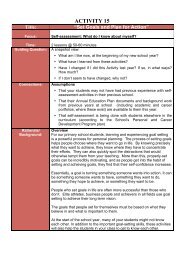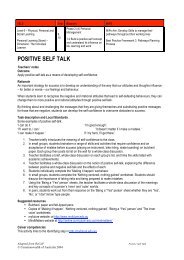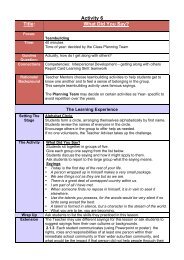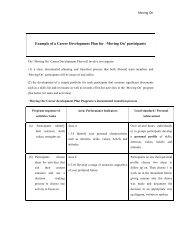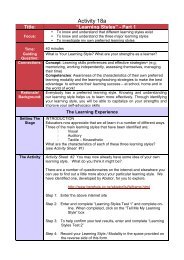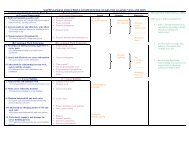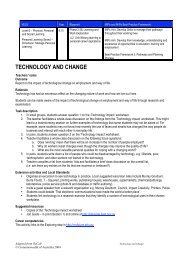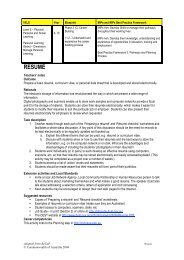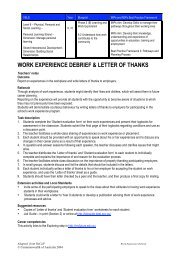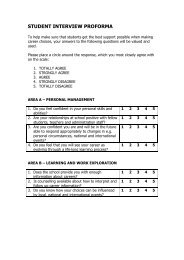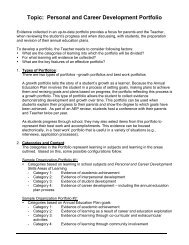Re-write of case studies - Blueprint - Australian Blueprint for Career ...
Re-write of case studies - Blueprint - Australian Blueprint for Career ...
Re-write of case studies - Blueprint - Australian Blueprint for Career ...
Create successful ePaper yourself
Turn your PDF publications into a flip-book with our unique Google optimized e-Paper software.
PD Kit<br />
4.3 Assessing <strong>Career</strong> Management Competencies<br />
Because in the past, practitioners frequently ‘tested’ individuals to determine their career<br />
direction, the view <strong>of</strong> assessment is sometimes limited to the idea <strong>of</strong> matching or testing in<br />
order to find the ‘right’ occupation, rather than being inclusive <strong>of</strong> a range <strong>of</strong> nonstandardised<br />
<strong>for</strong>mal and in<strong>for</strong>mal assessment methods, including self-assessment.<br />
Once you know what you are measuring, you need to select an appropriate assessment<br />
method from the host <strong>of</strong> possibilities, including:<br />
• direct observation<br />
• simulations<br />
• role-plays<br />
• written questions<br />
• interviews<br />
• portfolios<br />
• in<strong>for</strong>mation about life experience<br />
• testimonials, and<br />
• reports from others.<br />
The widespread community view that everything can be measured with a number has<br />
made some career development practitioners very wary <strong>of</strong> assessing career management<br />
competencies. Obviously, it’s easier to assess countable items, but some things just cannot<br />
be counted (eg, the taste <strong>of</strong> chocolate, the beauty <strong>of</strong> a music solo, the quality <strong>of</strong> a<br />
decision).<br />
Un<strong>for</strong>tunately, because people <strong>of</strong>ten have difficulty answering the questions ‘How are we<br />
going to measure this?’ and ‘What does “well” mean?’, they stop ef<strong>for</strong>ts to find observable<br />
behaviours to measure. <strong>Re</strong>sist this temptation as much as you can.<br />
When something can be measured in an objective way, make every ef<strong>for</strong>t to do so. When<br />
something can be measured in only a qualitative way, do not try to reduce the behaviour to<br />
something countable! The following qualitative assessment methods have proved suitable<br />
<strong>for</strong> assessing career management competencies.<br />
Interviews<br />
Interviewing is a data collection technique in which in<strong>for</strong>mation about an individual’s<br />
achievement levels can be obtained through a one-to-one conversation. Typically, these<br />
interviews are conducted in person; however, they may also be conducted by telephone.<br />
A set <strong>of</strong> semi-structured interview questions provides the basis <strong>for</strong> the interview. This<br />
method gives the interviewer an opportunity to probe <strong>for</strong> further in<strong>for</strong>mation if warranted<br />
by the initial response.<br />
Diaries and Journals<br />
Self-reporting diaries and journals can provide insight into an individual’s activities,<br />
attitudes and feelings. They are subjective and provide indicators <strong>of</strong> growth and change.<br />
40 AUSTRALIAN BLUEPRINT FOR CAREER DEVELOPMENT – ADULTS PD KIT


